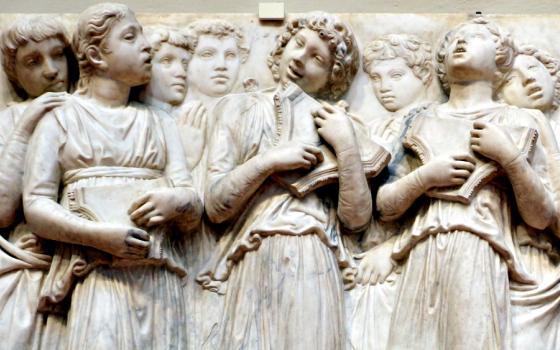"Don't try so hard to sing it pretty," she urged us, "just sing with purpose. Sing the way our ancestors did. Move the sound up into your cheekbones so it's almost nasal and let it flow out of you: natural and soulful."
We were gathered, about 20 women, in a circle in a spacious red Wisconsin barn. It was my first time rehearsing with the Threshold Choir, a group whose mission is to sing for people on the thresholds of life (sickness, death, a move, a birth) and our leader was teaching us a new song. It was a simple piece from Georgia, consisting of just one word.
"Nanila," we sang, over and over. Grandmother. As we slowly shed the constraints of the "correct" way we'd been taught to sing, our song took shape; one part became two, which widened to three. Something uncoiled inside of me and I noticed with surprise the sudden warmth of tears on my face.
Maybe the aching melody awoke something within me, some bone-deep gratitude and inexplicable love for ancestors I've never known. Maybe I needed to mourn how little I know of their stories. Certainly, I felt surrounded by them, my grandmothers and grandfathers in both genealogy and faith.
I have found myself humming that song this week as we celebrate the feasts of All Saints and All Souls. These liturgical celebrations are two of my favorites. I love that our liturgical calendar gives us ample opportunity to remember and pray with our models in faith, not just on these days but throughout the year. It is a sacred task to give thanks for their lives and their legacies through celebrations of feast days and the daily reading of our necrology, the list of sisters and loved ones who died on any given date.
One such person is my community's founder, Fr. Samuel Mazzuchelli. A remarkable man who left his native Italy at age 21 to become a missionary priest, Father Samuel embraced the unfamiliar terrain of the American frontier. He demonstrated uncommon respect for peoples of diverse cultures, advocated for the rights of Native peoples, promoted education for young women, built churches and founded parishes, and nurtured the seeds of the Catholic community through a wide swath of the Midwest prairies.
Reflecting on his life, as we celebrate our Founder's Day this week, I can't help but feel awed, inspired and even a little intimidated. How could I ever hope to carry on such a legacy? It's easy to extol the admirable qualities of the saints and it's equally tempting to believe ourselves incapable of their holiness. But this view misses the point entirely.
We are surrounded, as St. Paul reminds us, by a great cloud of witnesses (Hebrews 12:1). The saints aren't unattainable models of greatness; they're our ancestors in faith, "family members" with whom we are in relationship whether we recognize it or not. Through both their accomplishments and their failures — in other words, our shared humanity — they point us to Christ. They show us that there are many ways to embrace holiness, and they help us understand our common story.
Like all saints, Father Samuel's life only bore fruit because he was wholly in love with God and deeply grounded in relationship with others. As one of my wiser sisters recently reminded me: "We're not going to heaven separately. We're going together."
The power of the saints lies in their — and our — communion. Just as the Threshold Choir gathers to sing one another across the thresholds of our lives, so the saints do for us. Not as inaccessible semi-deities on high pedestals, but as a diverse family joined together with one purpose: to sing each other home.
[Christin Tomy is a Dominican Sister of Sinsinawa, Wisconsin. While living and working in Central and South America, she discovered a passion for ecological work, and she currently ministers as Care for Creation Coordinator at Sinsinawa Mound.]

